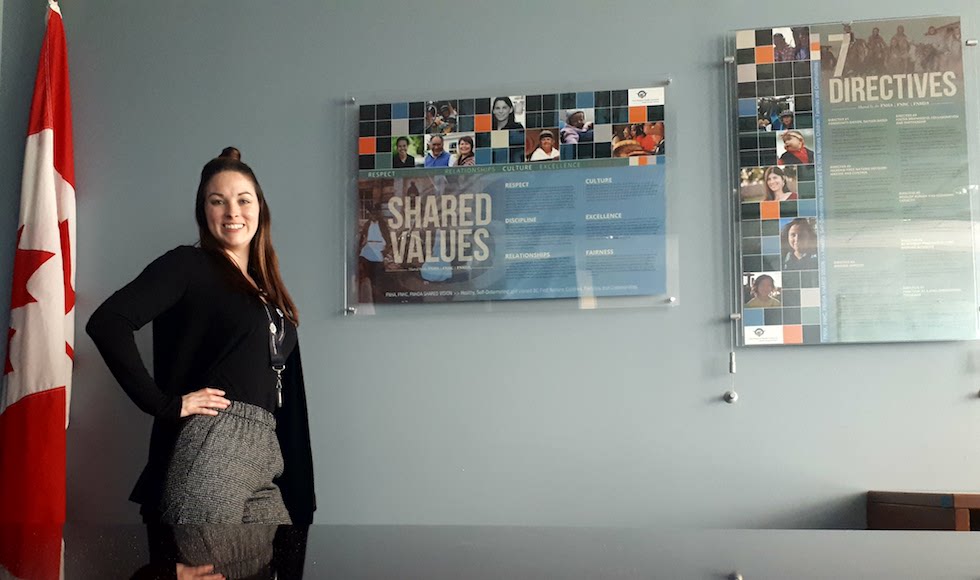Why cultural safety is critical to the health of First Nations

MSc Global Health graduate Erin Slade is currently working with the First Nations Health Authority (FNHA) in Vancouver as a policy analyst.
BY Ruth Adair
July 11, 2019
Erin Slade is following her passion to tackle poor health outcomes among First Nations in her home province of British Columbia.
The Master of Science in Global Health program graduate is currently working with the First Nations Health Authority (FNHA) in Vancouver as a policy analyst in the Health Benefits department, where she develops policies that govern health benefits.
As an ally and advocate, Slade is involved in work that directly impacts access to health care for First Nations across BC – and it’s not a responsibility she takes lightly.
“I’m learning what meaningful community engagement and partnership truly looks like,” says Slade, who works collaboratively with other FNHA departments, provincial health authorities and federal government representatives on behalf of First Nations communities.
One of her recent projects is to make sure the FNHA’s pharmacy benefit is responsive to the ongoing opioid crisis, and her role involves engaging with stakeholders in Vancouver’s downtown east side and across the province in often remote communities.
Slade has also been working to ensure that First Nations living with Hepatitis C have access to testing, and she’s lobbying for new, game-changing medications for treatment to be fully covered as a health benefit.
Slade stresses the importance of cultural safety in her work. It’s an approach that considers how social and historical contexts, as well as structural and interpersonal power imbalances, shape health and health care experiences.
“Cultural safety isn’t a certificate to go on your resume or a promotion tactic for your institution, and it goes beyond good intentions – it’s something to live by,” she explains.
“Cultural safety requires life-long learning and humbleness in recognizing you can’t ever fully comprehend the human impact of colonization without lived experience.”
Slade stresses the importance of taking initiative for concrete, positive action.
“Health care is leaning towards wellness and preventative care, rather than reactive medicine and a sickness model of health – something First Nations have known and practiced for a millennia. We need to listen and act,” she says.
The Global Health program, Slade says, helped her prepare for the work she is doing now by providing her with a strong understanding of the Canadian health care system and the politics of health and funding. In addition, she was able to explore Indigenous health through class projects, assignments and courses.
Having grown up in Kamloops, Slade completed a bachelor of science degree in biology, specializing in human physiology, with a minor in psychology at Thompson Rivers University.
The opportunity to specialize in global diseases and the combination of practical and theoretical learning were some of the reasons Slade chose McMaster for global health. Upon graduating, she realized just how well the program had equipped her with the skills needed for a career in the global health field.
Slade’s global health field practicum was based in Warsaw, Poland, where she was program manager for Gap Medics in the country’s largest public hospital. Working alongside health practitioners and hospital administration, she spent more than 12 hours a day in the hospital’s operating theatres and consultation rooms managing a shadowing program in a fast-paced and unpredictable environment.
This experience will serve her well, as she has recently been accepted to the MD program at the University of British Columbia, where she will begin her rural medicine training this summer.
Long term, Slade sees herself serving remote communities as an infectious disease specialist, dedicated to clinical practice and to shaping health policy and programming in a way that respects Indigenous voices, traditions and unique needs. And she’s well on her way to achieving that goal.


